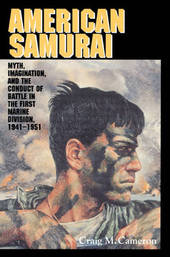
|
American Samurai: Myth and Imagination in the Conduct of Battle in the First Marine Division 1941-1951
Paperback / softback
Main Details
| Title |
American Samurai: Myth and Imagination in the Conduct of Battle in the First Marine Division 1941-1951
|
| Authors and Contributors |
By (author) Craig M. Cameron
|
| Physical Properties |
| Format:Paperback / softback | | Pages:316 | | Dimensions(mm): Height 228,Width 154 |
|
| Category/Genre | World history - from c 1900 to now |
|---|
| ISBN/Barcode |
9780521525923
|
| Classifications | Dewey:359.960973 |
|---|
| Audience | | Professional & Vocational | | General | |
|---|
| Illustrations |
Worked examples or Exercises
|
|
Publishing Details |
| Publisher |
Cambridge University Press
|
| Imprint |
Cambridge University Press
|
| Publication Date |
25 July 2002 |
| Publication Country |
United Kingdom
|
Description
Events on the battlefields of the Pacific War were not only outgrowths of technology and tactics, but also products of cultural myth and imagination. American Samurai offers a bold and innovative approach to military history by linking combat activity to cultural images. Marines projected ideas and assumptions about themselves and their enemy onto people and events throughout the war--giving life to formerly abstract myths and ideas and molding their behavior to expectations. This fascinating book concludes by considering what happened to the myths and images and how they have been preserved in American society to the present.
Reviews"...an interesting, readable, well-researched examination of the First Marine Division..." Teaching History "Well researched and well written, the book is well worth reading." Choice "Craig Cameron offers the most careful, complex, and critical study yet of the relationship between imagination and conduct for America's World War II soldiers. Deftly combining older and newer historical methods, and avoiding the jargon and myopia of both, Cameron creates a sensitive, often chilling portrait of how soldiers are prepared for war, changed by it, and encouraged to remember it." Michael S. Sherry, Northwestern University "This is a stimulating pursuit of accepted aspects of the Corps usually not delved into. I recommend it." Richmond Times-Dispatch "[Cameron's] effort to subject to analysis what has often been passed over is worth reading, certainly for anyone who has ever wondered about the sources of unit cohesion and combat motivation." Marine Corps Gazette "Cameron's book makes the reader think about the acts of war and military institutions in an entirely new light. The great effort of the past half-century to look on soldiers as social beings has been brought down to earth. The hoary art of battle description has been provided with a new hand-maiden. And those who, like the author of this review, spend their days examining the dry bones of doctrine and tactics, are forced, if only for a few hours, to confront the horrible truth that wars are fought by human beings." Bruce I. Gudmundson, Journal of Military History "Cameron has created a superb portrait of how soldiers are prepared for war, changed by it, and encouraged to remember. Combining the best of historical methods, boys classic documentary research and newer statistical models, he manages to avoid the blind spots and propaganda, and to seek a unique social psychological analysis of the transformation of young men into soldiers and then battle-hardened soldiers into patriotic veterans. Highly recommended." Reader's Review "...sophisticated and fascinating...Cameron's anaysis of the multiple uses and meanings of gender in this war is perhaps the best part of an exceptionally good book." Beth Bailey, American Historical Review "...an insightful and provocative study of the role cultural myths and images play in the construction of an American warrior elite...Cameron's book is a good example of how a sensitive historian can shape a revealing cultural history from military sources. He raises timely questions about the ownership of memory and about the ongoing clash between liberal and conservative narratives of World War II, now read through the filter of the Vietnam experience." Edward T. Linenthal, Journal of American History "Only the most disinterested reader will fail to be challenged by American Samurai. For this reason alone, Cameron is to be commended and, one hopes, widely read." Social History
|